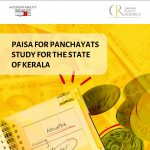
From an IAS Officer’s perspective
1 December 2017
Sanskriti Jain is presently a Sub-Divisional Magistrate in Rewa, Madhya Pradesh. In the conversation below, she shares her experience of working as an IAS officer and offers some rare insights from the field.
What motivated you to look at a career in bureaucracy?

I was not exclusively thinking about joining the bureaucracy in the beginning, but my experiences in policy making made me realise that this was a very good way to connect to people and serve the country. Being an IAS officer is a coveted and difficult job. When one is going in for the exam, we have lofty ideas of the transformative impact we are going to have. What is to be remembered after is that the power and position that we hold has a consequence; even a small decision creates a big impact.
The chance to shoulder this responsibility drove me to give the exam. I am now accountable for a Sub-Division. I take care of issues as diverse as land administration, implementation of education schemes, and how the governance structure is performing. The range of job requirements and a chance to serve the country is what I now look forward to.
What is a major governance challenge you have encountered?
Governance depends a lot on the society that one is part of. Understanding what stakeholders- the people, people’s representatives, business interests, different arms of the government – want is critical. The main challenge here is complexity because of the stakeholders involved and how participative they are. For instance, in India, this is why some states are doing well, while others are not. Local governance bodies such as Panchayats depend on the participative spirit and which shows how they function at the grassroots level.
Since a one-shoe-fits-all approach does not also fit governance, in my experience, governance in India depends on the person responsible for implementation. This is how you see transformation through policies. The motivations of the person is key. At the micro-level, the person is part of a system which administers many major schemes and more sub-schemes. Connecting different people and bridging gaps on what they want (much like a manager’s role) is what this role demands.
Do you see your department changing to development needs?
I’ll quote a senior officer who once told me this – if you were to imagine a small wheel and a big wheel, then the big wheel moving faster than the small one can derail the entire system. It seems from the outside that the administrative structure is not addressing needs, but the actual situation for officers like me is more complicated. At my level, the bureaucracy is changing. We are using new technologies such as WhatsApp groups for instantaneous communication on administrative needs. We have weekly monitoring sessions and targets to achieve. Yet, if we try to do too much in a short span of time, the society will go off the rails. There are factors involved in governance other than the administrative system.
For example, there was a huge fire in fields around some villages. We had informed people to seek safe ground. We still couldn’t prevent 3 young children from dying, not because of the fire but because upper castes did not accept them for safety. These social dynamics also determine how much the government system can push for change both within the system and in the society it is operating in.
Can you share a memory that has touched you in your career as a bureaucrat?
As a trainee IAS officer I was entrusted with the Ujwala Yojana which provides cooking gas to households. I remember talking to one woman, an Anganwadi cook, who wanted to use wood. She had doubts that the cylinder would burst and was fearful of using it. This was an interesting experience because we had to convince her to use the gas cylinder and that it was safe. We ultimately made available over 64,000 cylinders across the districts!
We want to hear from you! Write to us at [email protected] if you would like to share your experience of being an IAS officer.





